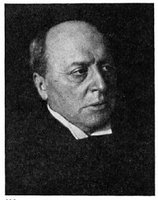 Henry James born 15 April 1843 (d. 1916)
Henry James born 15 April 1843 (d. 1916)Henry James was born in New York City to a prominent intellectual American family, and was educated in a childhood split between Europe and the States.
James's writing career was long and prolific, producing around thirty novels and novellas in addition to huge numbers of short stories, travel sketches and critical essays. He is significant for his role in developing the novel, innovating the dramatic presentation of character and the use of interior monologue as narrative.
By the turn of the century, his popularity had waned, although he continued to produce good work - The Wings of the Dove (1902), The Ambassadors (1903) and The Golden Bowl (1904) are often considered his literary masterpieces.
James's sexuality remained a subject of debate for many years because of his well-known friendships with women; because many critics were unable to read his homosexuality into his work; and because in literary circles, while he was acknowledged to be homosexual in his interests, the common opinion was that he did not actually indulge.
More modern critics have reappraised his work and placed a different interpretation on his 'ambiguity'. It has also become clear that James enjoyed close relationships of a romantic, even erotic, nature with several young men of his acquaintance. It could also be that his place in the literary closet may have been down to Oscar Wilde, whose flamboyant sexuality he abhorred, and whose scandalous trial drove so much of gay society scurrying terrified for cover.
Comfortable in the cultural environment of Europe, Henry James settled in England in 1875. In 1914, James became heavily involved in the war effort in support of British troops and frustrated by the US government's reluctance to commit to WW1, became a British citizen in 1915. His health began to deteriorate soon after, and he died from a stroke in 1916 at his home in Rye.